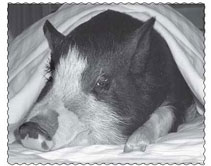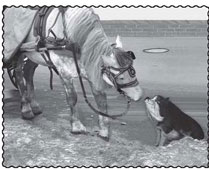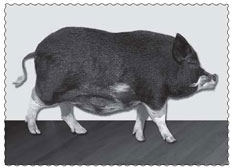Swine Not? (6 page)

A Poetic Pig

BARLEY
D
AD SENT
me a Red Bulls jersey and again promised me a game the next time he saw me. I hoped he would come around more often now that we were in New York, but I had taken it upon myself to figure out how to get to my first Red Bulls game, whether Dad was with me or not. As soon as I had a weekend free and learned how to get around the city on the subway, I was going to head out to New Jersey to see my team. It was late in the season, and they were in the hunt for a play-off spot.
It only took a week of living in a glass house on top of a high-rise in the middle of Manhattan to put some order into our lives. Between Mom’s new job and our new school, we all hit the ground running.
At first, I really missed Pancake Park and our big house in Vertigo, but that faded quickly. New York, my birthplace, was where I belonged. And although the only barnyard animal we’d brought was Rumpy, the square footage we had to share was a lot smaller in New York. Rumpy was by far the neatest of the females, except when it came to eating. Her obsession with food was more difficult in our new home, especially for guests. Back in Vertigo, she had room to graze. Here in New York, I thought a few rules were in order, so I posted this on the refrigerator door:
L
ADIES, PLEEZE BY BARLEY MCBRIDE
A spaceship occupied by pigs
Is nothing like the normal digs.
Its system must incorporate
A crazed-with-hunger vertebrate.
A thing routinely left intact
Might well become a piggy snack.
Her snout has powers unsurpassed
And never would she choose to fast.
Guests arriving at our door
Are warned to keep bags off the floor,
Since any package that arrives
Our pig could easily pulverize.
Her jaws will crush through any box
Containing candy, soap, or lox,
And purses bearing one Altoid
Most indiscreetly get destroyed.
Those kitchens where a pig patrols
Have quirky rules and complex goals.
With garbage but a tempting feast,
Trash is kept well out of reach.
The cook knows any pinch of food
Can titillate the piggy’s mood.
Stems and cores, stalks and peels,
Recycle into stellar meals.
When backs are turned, she strikes in greed
And runs, achieving shocking speed.
She punctures all stray cans of beer
And licks them up with rising cheer.
The glass of wine left on the floor
She drains, then slips into a snore.
Impulses of our precious swine
Are far from easy to divine.
A handful of our frequent guests
She loves — while others she detests.
We welcome and appreciate
The few who think our pig is great.
So bright and winning from the start,
A constant hunger drives her heart —
Which makes it hard to reprimand
The pig we love, a shark of land.
Welcome to New York

RUMPY
O
KAY, OKAY
, a grain of truth is in Barley’s poem, but pleeze! Such exaggeration. Then again, it shows a healthy respect for my appetite. Maple calls it an unharnessed force of nature, and Barley says when there’s food around, I’m a hurricane in reverse. But the twins are easily impressed.
Speaking of impressions, let’s just say Barton Academy initially made a big one on both Maple and Barley. From the moment they stepped off 87th Street and into the tall brick building, they knew they were a long way from Vertigo. For Barley, it was the sports teams, and, of course, soccer season started the year. For Maple, it was the ripe little plum of information that Karen Wu had actually been a student at Barton Academy, and she was on the board of directors of the school. Maple needed no more motivation. The twins never once mentioned what must have been a huge shock — going to a city school with a cramped playground, a curious student body, teachers with foreign accents, uniform blazers, and the disruption caused by sirens, horns, and construction equipment that would be the constant background noise in their education.
Then there was the social side of things. Luckily for my twins, they were immediately perceived by the city kids as cool — not as hicks from the sticks. I must admit, I think I played a part in that, because Maple told us how fascinated the city kids were with her story about a pet pig that did a tango imitation of P. Diddy at a talent contest. Yes, I can make a curtain call when asked.
New York kids simply couldn’t believe that anybody had a pig for a pet. Boy, were they in for a surprise. I felt my New York debut was just around the corner. Maple would design my costume, and I would be a hit. I heard that New York audiences were tough and much more sophisticated than what I was used to in Tennessee, but I knew I could handle them. Still, I had not come to New York just to be in the spotlight.
Once we were moved in, I had to get down to business; it was time to find Lukie. Scent-mails were in the air, but there was no sign yet of my brother. This meant I’d have to go back to basics and sniff a few streets. I wasn’t going to find Lukie by blogging some MySpace site. One of the good things about living in the glass house on top of the hotel was that it took on the function of an observation post. From there, my short-legged view of the world was magnified immensely. I felt as if I had stepped into the tallest pair of elevator shoes in the world.
One day, while pondering how to find Lukie, I saw that the sky above me was suddenly darkened by a strange gray cloud. Upon closer inspection, I realized that it wasn’t a cloud at all but a flock of pigeons. They swooped across my view as if they were trying to tell me something. Suddenly it dawned on me that notifying the pigeons would be an excellent tactic, since they could see everything in the city.
This uptown-downtown flock seemed to patrol the airspace above and around Central Park. Maybe — if the pigeons would cooperate with me — I could begin my search for Lukie tomorrow morning after Ellie went to work and the kids were off to school. That left the rest of the afternoon to see the city. I made my way out of the fish tank, down the service elevator, and across the alley to the street. As soon as I stepped onto the sidewalk, I was overwhelmed again.
A handsome horse smiled at me from where his carriage stood. Green grass and flowers lined the streets. The air was filled with the smell of lunchtime, which brought happy tears to my eyes . . . and a tiny trickle of drool to my lips. I was thrilled to find that there was more to this town than just hot dogs. Everywhere I went, I saw pretzels steaming, popcorn spilling, and restaurant doors wide open. With such dazzling food every few feet, no wonder people were drawn here.
I sat to observe the locals and was struck by how unlike other humans they were. Each was crisply dressed and pressed for time, and seemed to be suffering from stress. Lacking the plumpness I was used to seeing in Tennessee, the local humans were more angular. Stylish yet emaciated, the ladies shared a facial expression I knew well: the intense longing for something to eat. They were shockingly underfed, considering the abundance of food in sight.
One man, however, was trying to address the problem. He stood in the park in front of a huge blender, making fruit smoothies, which he was distributing to anyone interested — if they stood in front of the blender. Famished, I ambled over to join the line and lap one up.
To my amazement, the people nearby screamed at me in fear and backed away, nearly running. Desperate to calm them, I spotted an accordion player and instantly picked up his beat, moving my haunches to the rhythm. But this made the humans more frantic than ever, shouting, “Get back! It must be rabid!” and “Run! It’s about to attack!”
Their reaction was entirely bizarre. A man poked his head out of a kebab wagon next to the smoothie stand and cursed me for running off his crowd. In a terrible rage, he began hurling soda cans at me, and others followed his lead but used rocks instead. When a sharp one hit my shoulder, I broke into a whimpering run and flew back the way I had come. Bleeding and disheartened, I skidded through the service doors and onto the freight elevator.
What was the problem? I had come to New York with open hooves to embrace the city, its people, and its animals, but everybody was treating me as if I were a terrorist. I was accustomed to good manners, admiration, and, frankly, even star treatment. Now I was finally where I wanted to be, but everything was wrong.
How did Lukie survive here, where pigs were considered monsters? By the time I got home, I was emotionally wrung out. For once, I wasn’t hungry. All I wanted to do was get to Maple’s closet, find my Lukieball, and cuddle up.
When I crept through the kitchen, I heard Barley in the living room, talking to someone. I stopped for a moment at the open door. Barley wouldn’t look at me, but I knew he knew I was there. Something strange was going on, and I had seen enough strange stuff for one day. I headed for the closet. It crossed my mind that Barley might be protecting me . . . and then the truth slapped me in the face: New York was filled with prejudice, and my kind wasn’t welcome.
When we had arrived that first day, and we saw the Statue of Liberty in the distance, Barley quoted the words written on the base: “Give me your tired, your poor, your huddled masses . . .”
But those words were clearly for people, not pigs.
Warning Signs

BARLEY
W
HEN YOU
grow up with a pig as a pet, the click of tiny hooves supporting a lot of weight is an absolute giveaway of her presence. It sounds like somebody is walking around in tap shoes all the time. When I heard the click, click, click come from the kitchen, it wasn’t the sound but the pace at which her legs were moving that clued me in that something was up. Ordinarily, I would have immediately followed and found Rumpy to make sure she was all right, but I had a bigger problem. After I came back from soccer practice, I had encountered a garrulous man with a high-pitched voice who smelled of motor oil and cigarettes. What was most disturbing about this stranger was the fact that he was in our home alone. He introduced himself as the hotel building superintendent and said he was there to check out our pipes and wall sockets, but I had a hunch he was snooping around.
The man’s name was Murray, and Freddy, the doorman, had warned me about him a few days earlier. Freddy had also told me that maybe it was best not to have so many people over to see Rumpy do her thing. Then he looked frightened, scanning the lobby to see if anyone was watching us. He leaned down and, in a loud whisper, said, “Boucher, the head chef, is back in the hotel.”
Murray asked way too many questions, and his eyes never met mine. His neck jerked as he went from room to room with his flashlight on and his tool belt rattling. He had gone through every room except Maple’s and was heading in that direction when I said, “My sister’s asleep in there. She’s not feeling well.”
Murray shone his flashlight into the hallway and finally looked at me. “Dis uhl only take a second,” he said, and started to open the door.
“We think she has the mumps,” I blurted out.
Murray let go of the doorknob and clicked his flashlight off. “Well, I’m sure tings is okeydokey in dere. Hope yaz sistah gets betta.”
I walked him to the door and watched as he sauntered away across the roof. Then I rushed back to Maple’s room. When I opened the door, Rumpy and Syrup were piled together in the corner of the closet, asleep.
Something wasn’t right. Mom would be home any minute, and I needed to talk to her.
